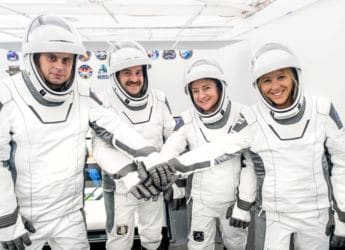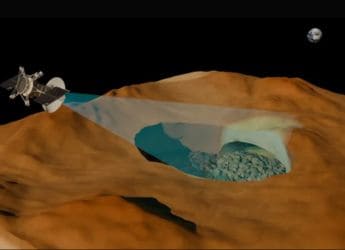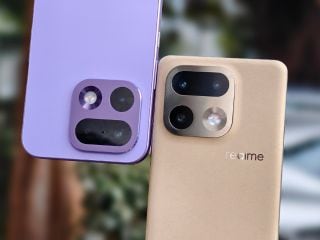- Home
- Science
- Science News
- ISRO’s Aditya L1 Solar Mission Begins Collecting Scientific Data in Earth’s Orbit
ISRO’s Aditya-L1 Solar Mission Begins Collecting Scientific Data in Earth’s Orbit
The sensors on board India's first solar observatory have begun measuring ions and electrons at distances greater than 50,000 km from Earth.

Photo Credit: ANI
ISRO launches solar mission, Aditya-L1 from Satish Dhawan Space Centre in Sriharikota
India's Aditya-L1 solar mission spacecraft has commenced collecting scientific data to help scientists analyse particles surrounding Earth, ISRO said on Monday.
The sensors on board India's first solar observatory have begun measuring ions and electrons at distances greater than 50,000 km from Earth, ISRO announced in a post on X.
The national space agency said that the sensors on STEPS or the Supra Thermal & Energetic Particle Spectrometer instrument began measuring supra-thermal and energetic ions and electrons at distances greater than 50,000 km from Earth.
The instrument is a part of the Aditya Solar Wind Particle EXperiment (ASPEX) payload of Aditya L1.
Aditya-L1 Mission:
— ISRO (@isro) September 18, 2023
Aditya-L1 has commenced collecting scientific data.
The sensors of the STEPS instrument have begun measuring supra-thermal and energetic ions and electrons at distances greater than 50,000 km from Earth.
This data helps scientists analyze the behaviour of… pic.twitter.com/kkLXFoy3Ri
STEPS comprises six sensors, each observing in different directions and measuring supra-thermal and energetic ions ranging from 20 keV/nucleon to 5 MeV/nucleon, in addition to electrons exceeding 1 MeV. These measurements are conducted using low and high-energy particle spectrometers.
The data collected during Earth's orbits helps scientists to analyse the behaviour of particles surrounding the Earth, especially in the presence of its magnetic field.
STEPS was activated on September 10 at a distance greater than 50,000 km from Earth. This distance is equivalent to more than eight times the Earth's radius, placing it well beyond Earth's radiation belt region.
After completing the necessary instrument health checks, data collection continued until the spacecraft had moved farther than 50,000 km from Earth.
These STEPS measurements will persist during the cruise phase of the Aditya-L1 mission as it progresses toward the Sun-Earth L1 point. They will continue once the spacecraft is positioned in its intended orbit.
Data collected around L1 would provide insights into the origin, acceleration, and anisotropy of solar wind and space weather phenomena.
STEPS was developed by the Physical Research Laboratory with support from the Space Application Centre in Ahmedabad.
Aditya-L1 was launched by ISRO on September 2.
The spacecraft carries seven different payloads to study the Sun, four of which will observe the light from the Sun and the remaining three will measure in situ parameters of the plasma and magnetic fields.
Aditya-L1 will be placed in a halo orbit around the Lagrangian Point 1 (L1), which is 1.5 million km from the Earth in the direction of the Sun. It will revolve around the Sun with the same relative position and hence can see the Sun continuously.
Get your daily dose of tech news, reviews, and insights, in under 80 characters on Gadgets 360 Turbo. Connect with fellow tech lovers on our Forum. Follow us on X, Facebook, WhatsApp, Threads and Google News for instant updates. Catch all the action on our YouTube channel.
Related Stories
- Samsung Galaxy Unpacked 2025
- ChatGPT
- Redmi Note 14 Pro+
- iPhone 16
- Apple Vision Pro
- Oneplus 12
- OnePlus Nord CE 3 Lite 5G
- iPhone 13
- Xiaomi 14 Pro
- Oppo Find N3
- Tecno Spark Go (2023)
- Realme V30
- Best Phones Under 25000
- Samsung Galaxy S24 Series
- Cryptocurrency
- iQoo 12
- Samsung Galaxy S24 Ultra
- Giottus
- Samsung Galaxy Z Flip 5
- Apple 'Scary Fast'
- Housefull 5
- GoPro Hero 12 Black Review
- Invincible Season 2
- JioGlass
- HD Ready TV
- Laptop Under 50000
- Smartwatch Under 10000
- Latest Mobile Phones
- Compare Phones
- OPPO K14x 5G
- Samsung Galaxy F70e 5G
- iQOO 15 Ultra
- OPPO A6v 5G
- OPPO A6i+ 5G
- Realme 16 5G
- Redmi Turbo 5
- Redmi Turbo 5 Max
- Asus Vivobook 16 (M1605NAQ)
- Asus Vivobook 15 (2026)
- Brave Ark 2-in-1
- Black Shark Gaming Tablet
- boAt Chrome Iris
- HMD Watch P1
- Haier H5E Series
- Acerpure Nitro Z Series 100-inch QLED TV
- Asus ROG Ally
- Nintendo Switch Lite
- Haier 1.6 Ton 5 Star Inverter Split AC (HSU19G-MZAID5BN-INV)
- Haier 1.6 Ton 5 Star Inverter Split AC (HSU19G-MZAIM5BN-INV)







![[Partner Content] OPPO Reno15 Series: AI Portrait Camera, Popout and First Compact Reno](https://www.gadgets360.com/static/mobile/images/spacer.png)









